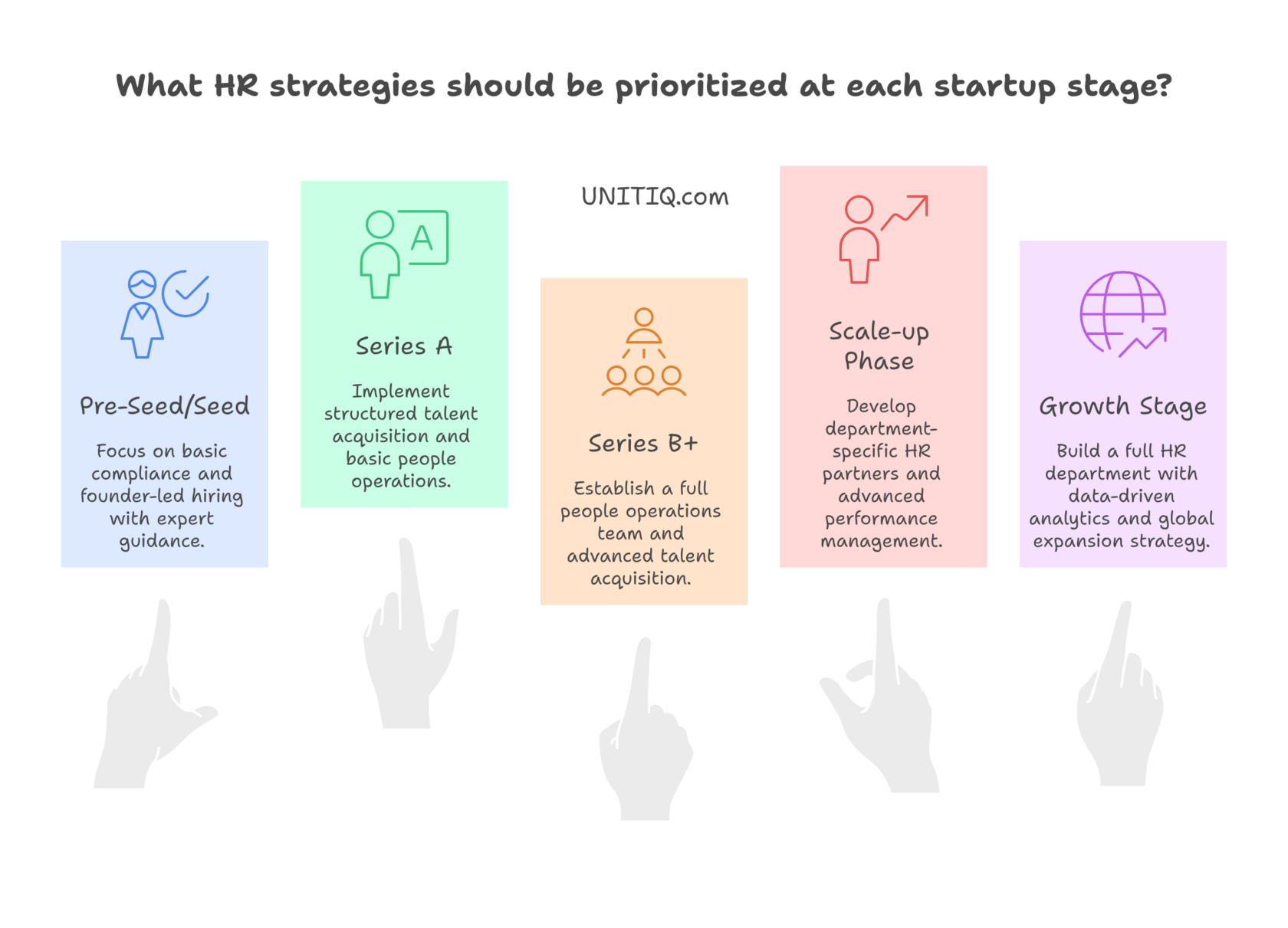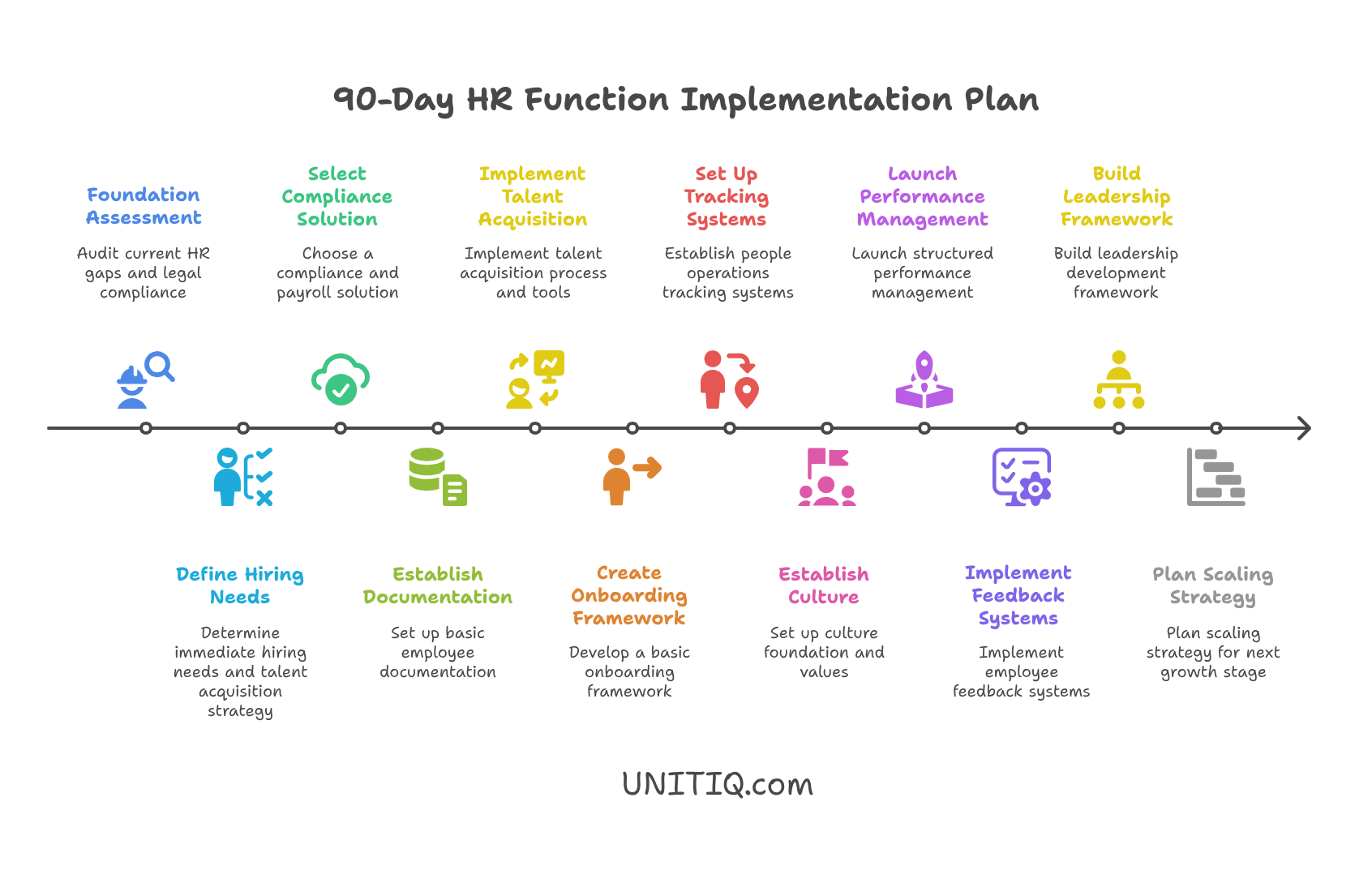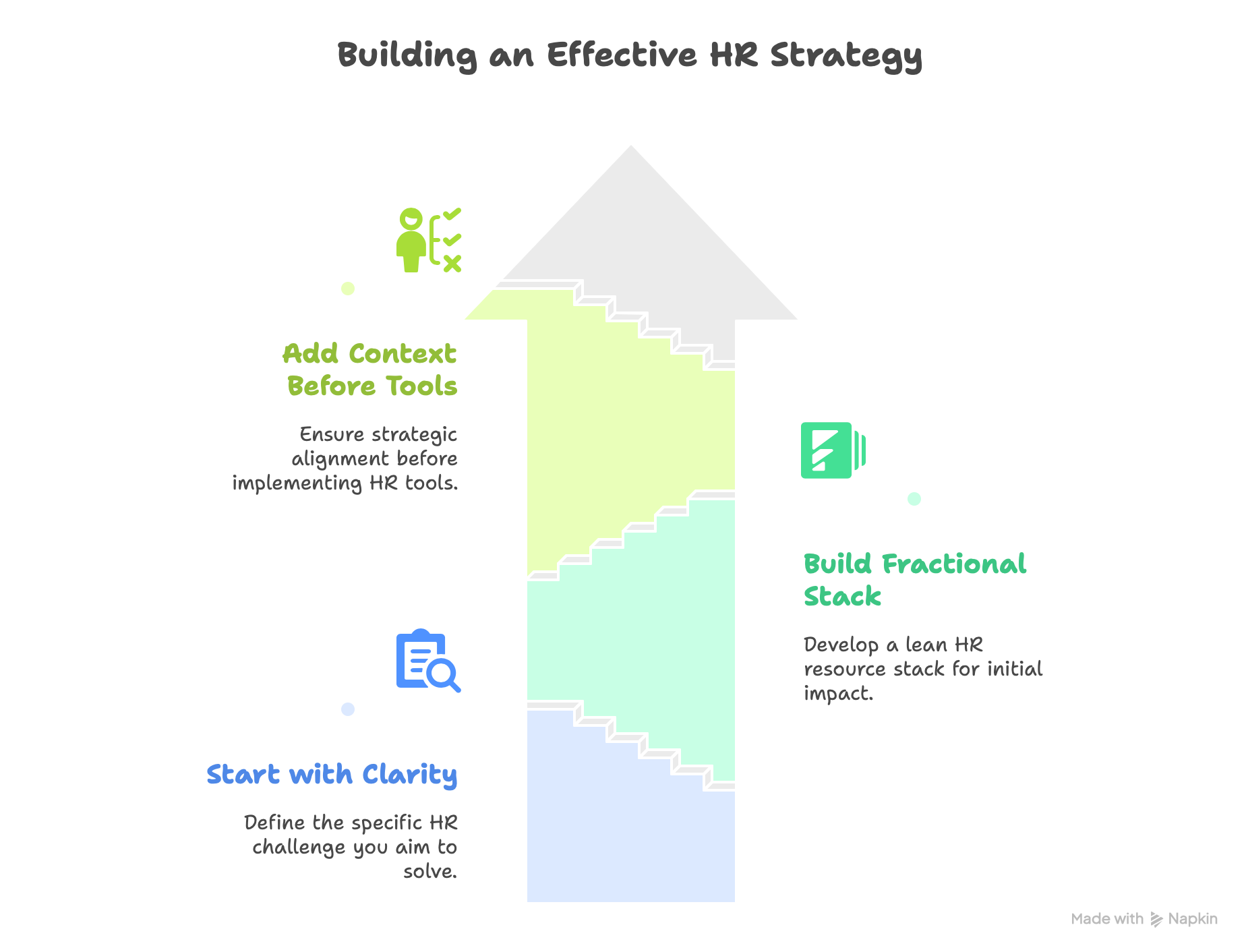🧩 What HR Services Do Startups Actually Need?
When you say “HR,” what do you really mean?
For many startup founders, “HR” is a catch-all for everything they don’t want to deal with — payroll, contracts, job posts, culture… you name it. But lumping it all together leads to chaos, mis-hires, legal risks, and lost momentum.

Let’s clear it up. Here’s what early-stage companies actually need when they say they “need HR” — and how to build it right, without wasting time or headcount.
The $2.3 Million Cost of Getting Startup HR Wrong
The Hidden Cost of HR Confusion:
- 68% of startups hire their first HR person for the wrong function (Harvard Business Review)
- Bad early HR decisions cost startups an average of $2.3M in runway through mis-hires and legal issues (CB Insights)
- Companies that build HR functions strategically scale 40% faster than those with ad-hoc approaches (Deloitte)
The Reality:
Most founders think they need "an HR person" when they actually need 3-5 different functions handled by different specialists.
HR Needs by Startup Stage: A Strategic Roadmap

Pre-Seed/Seed (1-10 employees):
- Priority 1: Basic compliance and contracts (outsourced)
- Priority 2: Founder-led hiring with expert guidance
- Budget allocation: 80% compliance, 20% talent acquisition support
Series A (10-25 employees):
- Priority 1: Structured talent acquisition process
- Priority 2: Basic people operations and onboarding
- Priority 3: Culture framework development
- Budget allocation: 50% talent acquisition, 30% people ops, 20% compliance
Series B+ (25-75 employees):
- Priority 1: Full people operations team
- Priority 2: Advanced talent acquisition with specialists
- Priority 3: Leadership development and performance management
- Budget allocation: 40% people ops, 35% talent acquisition, 25% strategic HR
Scale-up Phase (75-200 employees):
- Priority 1: Department-specific HR business partners
- Priority 2: Advanced performance management and career development systems
- Priority 3: Executive coaching and leadership pipeline development
- Priority 4: Workforce planning and succession management
- Budget allocation: 45% strategic HR & leadership development, 25% specialized talent acquisition, 20% people operations, 10% compliance
Growth Stage (200+ employees):
- Priority 1: Full HR department with specialized functions
- Priority 2: Data-driven people analytics and predictive modeling
- Priority 3: Global expansion HR strategy and compliance
- Priority 4: Organizational design and change management
- Budget allocation: 35% strategic HR, 25% talent acquisition, 25% people operations, 15% compliance & legal
How to Choose: Build, Buy, or Partner for Each HR Function
When to Build In-House:
- High-volume hiring (5+ hires per month)
- Complex people operations needs
- Industry-specific compliance requirements
- Strong internal HR leadership available
When to Outsource:
- Basic compliance and payroll
- Specialized recruitment for hard-to-fill roles
- Legal and employment law guidance
- Benefits administration
When to Use Fractional/Advisory:
- Strategic guidance without full-time need
- Specialized expertise for specific projects
- Bridge solutions while building internal capability
- Access to senior-level expertise on startup budget
Red Flags to Avoid:
- Hiring "HR generalist" as first HR person
- Choosing providers who don't understand startup pace
- Outsourcing culture and people operations entirely
- Skipping strategic HR input to save costs
Your 90-Day HR Function Implementation Plan

Days 1-30: Foundation Assessment
- Audit current HR gaps and legal compliance status
- Define immediate hiring needs and talent acquisition strategy
- Select compliance and payroll solution
- Establish basic employee documentation
Days 31-60: Core Function Setup
- Implement talent acquisition process and tools
- Create basic onboarding framework
- Set up people operations tracking systems
- Establish culture foundation and values
Days 61-90: Strategic Enhancement
- Launch structured performance management
- Implement employee feedback systems
- Build leadership development framework
- Plan scaling strategy for next growth stage
🚩 The Problem: HR ≠ One Role
Spoiler: Your first HR hire shouldn’t be someone to “do it all.” That person doesn’t exist.
Startups need HR functions, not just titles. And different stages call for different expertise.
Let’s break it down.
🧱 The 5 HR Functions Startups Actually Need
Read: Embedded vs. Agency explains why strategy matters
🧠 What Most Founders Get Wrong

Mistake #1: Hiring an HR generalist too early.
They often come from corporate and lack startup context. You’ll still need to lead.
Mistake #2: Calling it a “Head of People” when it’s really admin + recruiting.
Mistake #3: Outsourcing to a payroll provider and thinking “HR is covered.”
You’ve solved compliance. You haven’t solved culture, hiring, or team performance.
🚀 So What Do You Need?
For most startups (5–50 people), this setup works best:
Read - Embedded or fractional partner tied to your growth roadmap
🏗️ How to Build It Without Overhiring

Step 1: Start with clarity
Know what you’re solving — is it compliance? Is it speed in hiring? Is it retention?
Step 2: Build a fractional stack
Think of HR like a tech stack. Use lean, high-impact resources until you're ready to scale internally.
Step 3: Add context before tools
Don’t just buy an HRIS. Get someone who can tell you what to track, how, and why.
💡 Why This Matters Now
Hiring, retention, and culture are growth levers — not hygiene factors.
Treating HR as a cost center instead of a strategic asset keeps startups small.
The ones that scale treat it like a system that fuels performance, alignment, and speed.
Startup HR Strategy: Expert Answers to Common Questions
When should I hire my first full-time HR person?
Typically at 25-40 employees, depending on hiring velocity and complexity. Before that, fractional specialists and outsourced solutions are more cost-effective and provide better expertise.
What's the difference between People Ops and traditional HR?
People Ops focuses on employee experience, culture, and performance optimization. Traditional HR emphasizes compliance and administration. Startups need both but at different stages.
How do I handle HR for remote teams?
Emphasize strong onboarding, clear communication tools, regular check-ins, and culture-building activities. Remote HR requires more intentional people operations but can be highly effective.
Should I use an HR consultant or hire fractional HR?
Consultants provide project-based expertise; fractional HR offers ongoing strategic support. For most startups, fractional provides better value and business integration.
What HR compliance issues should early-stage startups prioritize?
Employment contracts, data protection (GDPR), workplace safety basics, and clear termination procedures. Focus on preventing the most costly legal risks first.
How do I measure HR function effectiveness?
Track time-to-hire, employee retention rates, onboarding satisfaction, performance review completion, and founder time saved on HR tasks.
🔁 Related Reading
🎯 Final Thought
Founders who treat HR as one role miss the point.
HR isn’t one thing — it’s a set of systems that drive your team’s performance and your company’s longevity.
Don’t wait until it breaks. Build it intentionally, step by step.
👉 Interesting? Let's Talk!
Building HR That Scales: Your Next Steps
HR isn't a cost center - it's a growth multiplier when built strategically.
This Week's Action Items:
- Assess which of the 5 HR functions you need most urgently
- Calculate the current cost of HR gaps (founder time, legal risk, poor hires)
- Research solutions for your highest-priority function
- Set budget for HR investments over the next 12 months
Next 30 Days:
- Implement basic compliance and legal protection
- Define your talent acquisition strategy and process
- Start building people operations framework
- Establish relationships with fractional HR specialists
The startups that scale successfully don't just hire great people - they build great systems for attracting, developing, and retaining talent.
Ready to build HR functions that fuel growth instead of slowing it down? UnitiQ has helped over 150 European startups implement strategic HR approaches that reduce costs while improving team performance.
About Author
Olga Fedoseeva is an award-winning HR executive and people strategist with over 20 years of international experience across EMEA, the US, and APAC. Currently Chief of Staff at Exponential Science and Founder of UnitiQ, she has personally hired more than 1,000 employees and scaled organizations from 30 to 3,000 staff. Recognized as one of the Top HR Women in EV (2021), Olga has led global HR transformation, talent acquisition, and people operations for startups, scale-ups, and multinational enterprises. Her expertise spans the full HR lifecycle—succession planning, DEI, HR tech integration, workforce planning, and executive coaching—helping businesses align people strategies with growth objectives while fostering inclusive, high-performance cultures.
